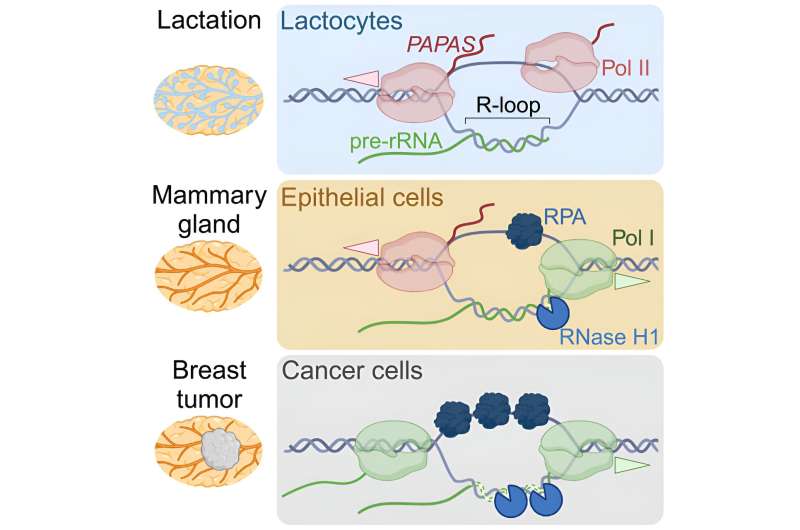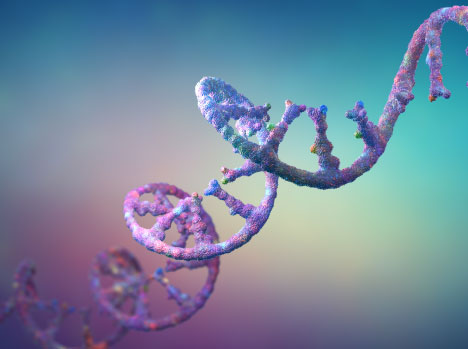
Breast cancer is the most common cancer in women. The development of breast cancer often originates from epithelial cells in the mammary gland—the very cells that specialize in milk production during and after pregnancy.
A team of researchers from Friedrich Schiller University Jena (Germany), the university in Shenzhen (China) and Jena University Hospital (Germany) has taken a closer look at this specialization process and deciphered a molecular mechanism that also appears to play an important role in cancer development.
It may be possible to develop new diagnostic procedures and treatment methods for breast cancer based on these research findings now published in Cell Reports.
Cell differentiation, i.e., cell specialization, is the process by which cells take on different tasks. During lactogenesis—the process triggered by hormones that enables the mammary glands to produce milk—the relevant cells multiply first. The proteins required for this are produced by the ribosomes. A fundamental building block of ribosomes is ribosomal RNA, or rRNA for short.
If more proteins are required, the demand for rRNA also increases, and its synthesis in the cell nucleus is ramped up accordingly. At the end of lactogenesis, the specialized cells stop growing and reduce rRNA synthesis again. This regulatory mechanism takes place at the epigenetic level, which means that it is not the DNA itself that changes, but its packaging, for which another type of RNA is responsible.
“We’ve found out that a long, non-coding RNA called PAPAS, which I had discovered a few years ago, acts on the packaging of the DNA and reduces rRNA production,” explains Dr. Holger Bierhoff, who is leading the project at the University of Jena.
“More precisely, PAPAS influences access to the active regions of the DNA and determines whether these are copied into RNA or not. If a lot of ribosomes and proteins, and thus a lot of rRNA are needed, the synthesis of PAPAS is reduced. If this process is to be stopped, the PAPAS level is increased.”
The experts in Jena also discovered that PAPAS not only plays an important role in cell proliferation, but also in specialization. “When we switched off PAPAS through gene manipulation in cells, we observed that the development into milk-producing cells no longer functioned properly,” says Bierhoff.
High PAPAS level, low tumor growth
Synthesis of rRNA is also increased in cancer cells, as they multiply rapidly and require a lot of proteins—and accordingly a lot of ribosomes. “We therefore asked ourselves whether the regulatory mechanism we observed also plays a role in the development of breast cancer. The answer is clearly yes,” explains cell biologist Bierhoff.
“When we reduced PAPAS synthesis and switched off cell specialization, we observed that the cells developed the characteristics of cancer cells.” In contrast, the researchers showed both in cell cultures and in mice that a high PAPAS level reduces tumor growth as well as the spread of metastases.
But how do cancer cells manage to switch off PAPAS production and thus boost rRNA synthesis? “We have also found a mechanism for this,” explains Bierhoff. “Production of PAPAS requires a molecular signal at the start of the PAPAS gene. This signaling structure is regulated by particular proteins, which can resolve or block the structure. We’ve observed that the production of these proteins is particularly high in breast cancer cells. The more aggressive the tumor, the more of them are present.”
For Holger Bierhoff, the research results are promising in two respects. “First, we see that PAPAS can be an interesting marker for assessing the aggressiveness of a breast tumor. This information could potentially be used as a diagnostic tool,” he says. “Second, we’re already working on developing an RNA therapy for cancer treatment. We know the mechanism by which PAPAS regulates rRNA synthesis and we know which region of the RNA is required for this.
“Now, the idea is to produce this part of PAPAS artificially, package it in nanoparticles, and introduce it into the cancer cells, thereby restoring its function. In this way, we would reduce rRNA synthesis, which the cancer needs to proliferate.” This strategy would be similar to mRNA vaccines, like the one against COVID-19, however, here a regulatory RNA instead of protein-coding RNA would be applied.
https://medicalxpress.com/news/2024-01-special-rna-shown-suppress-formation.html

Check out our mRNA service to expedite your vaccine research
PackGene Biotech is a world-leading CRO and CDMO, excelling in AAV vectors, mRNA, plasmid DNA, and lentiviral vector solutions. Our comprehensive offerings span from vector design and construction to AAV, lentivirus, and mRNA services. With a sharp focus on early-stage drug discovery, preclinical development, and cell and gene therapy trials, we deliver cost-effective, dependable, and scalable production solutions. Leveraging our groundbreaking π-alpha 293 AAV high-yield platform, we amplify AAV production by up to 10-fold, yielding up to 1e+17vg per batch to meet diverse commercial and clinical project needs. Moreover, our tailored mRNA and LNP products and services cater to every stage of drug and vaccine development, from research to GMP production, providing a seamless, end-to-end solution.
Related News
[2024/12/20] Gene and Cell Therapy- weekly digest from PackGene
FeaturedNewsArticlesPackGene's NewsletterReceive the latest news and insights to your inbox.About PackGenePackGene Biotech is a world-leading CRO and CDMO, excelling in AAV vectors, mRNA, plasmid DNA, and lentiviral vector solutions. Our comprehensive offerings span...
Sangamo and Astellas Collaborate to Advance Neurological Gene Therapies Using AAV Capsid Technology
Sangamo Therapeutics, Inc. (Nasdaq: SGMO), a leader in genomic medicine, and Astellas Pharma Inc. (TSE: 4503), a global innovator in life sciences, have partnered under a new license agreement. This collaboration centers around Sangamo’s cutting-edge neurotropic AAV...
Inceptor Bio and GRIT Bio Announce Strategic Partnership to Advance IB-T101, a Next-Generation Solid Tumor CAR-T Utilizing the OUTLAST™ Platform
SHANGHAI and MORRISVILLE, N.C., Dec. 18, 2024 /PRNewswire/ -- Inceptor Bio, a leading innovator in cell therapy, and GRIT Bio, a clinical-stage immunotherapy developer, today announced a strategic partnership to advance IB-T101, a potentially best-in-class CAR-T...
Proof-of-concept study bioengineers therapeutics for improved cancer treatment
Credit: Pixabay/CC0 Public DomainA team of Children's Medical Research Institute (CMRI) scientists has identified a new method for producing a therapeutic product that has the potential to improve the treatment of cancer. The work by Associate Professor Leszek...
Related Services

Plasmids GMP Services

AAV GMP Services


